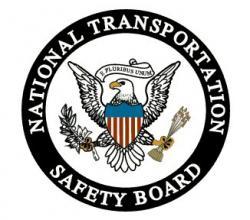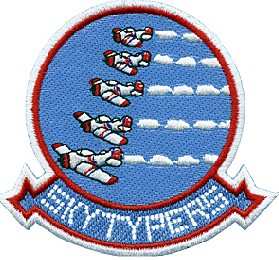Crucial Information Not Fully Disclosed On Medical Certificate
Application
 The National Transportation Safety
Board states the pilot of the GEICO SkyTypers North American SNJ-2
that crashed during a rehearsal flight for last year's Oceana Air
Show withheld crucial medical information from the FAA when
applying for renewal of his medical certificate, information that
might have led to denial of his flying privileges.
The National Transportation Safety
Board states the pilot of the GEICO SkyTypers North American SNJ-2
that crashed during a rehearsal flight for last year's Oceana Air
Show withheld crucial medical information from the FAA when
applying for renewal of his medical certificate, information that
might have led to denial of his flying privileges.
As ANN reported, on September 7, 2007,
74-year-old Jan Wildbergh piloted the trailing aircraft in a flight
of five that had just performed a low flyover at show center. The
group then executed a climbing right turn in formation, setting up
to land... but Wildbergh's aircraft failed to turn, instead
proceeding straight ahead in a wings-level attitude, losing
altitude until it impacted terrain. The crash destroyed the
aircraft and claimed the pilot's life.
According to the NTSB's updated factual report on the accident,
the FAA denied Wildbergh's application for a second-class medical
certificate in December 2005, when in a letter accompanying the
application his cardiologist disclosed that Wildbergh had been
treated for heart problems for approximately three years. Although
the physician's statement said the pilot “may continue to fly
aircraft without restriction from a medical standpoint,” the
FAA denied the application, due to Wildbergh's “history of
falsification of multiple previous FAA examinations for failure to
report” conditions, medical visits and evaluations in the
past three years.
Responding to the FAA in a letter in January 2006, Wildbergh
said "Because I had many tests, felt well, and my cardiologist told
me that 'he saw no reason why I couldn't fly,' I foolishly
exercised poor judgment when completing my medical form."
A report on further diagnostic studies performed in 2006 also
failed to mention chest pain and an abnormal heart rhythm following
a stress test. In July 2006, the FAA issued an Authorization for
Special Issuance of a second-class Medical Certification, expiring
in November 2006. A September 2006 letter from Wildbergh's
cardiologist to the FAA indicated that the pilot's condition had
been stabilized by medication.
 His most recent medical
certificate application, dated November 20, 2006, listed current
medications, including warfarin (a blood thinner), metoprolol (a
beta-blocker), and alfuzosin (an alpha-blocker), and indicated "No
change in previously reported medical conditions."
His most recent medical
certificate application, dated November 20, 2006, listed current
medications, including warfarin (a blood thinner), metoprolol (a
beta-blocker), and alfuzosin (an alpha-blocker), and indicated "No
change in previously reported medical conditions."
Wildbergh's personal medical records tell a different story,
however -- relating episodes of chest pain, shortness of breath, a
sense of fullness in the head, atrial fibrillation, and an abnormal
heart rhythm. None were reported to the FAA, despite the notation
on his medical certificate that "operation of aircraft is
prohibited at any time new symptoms or adverse changes occur."
The NTSB report quotes a clinical aviation medical text noting
that atrial fibrillation "is particularly troubling with regard to
physiologic responses to the high positive G environment of
aerobatic and high-performance military flight," further stating
"beta-blocker use in high-performance aviators is considered
unwise," and alpha-blockers "are not recommended for aviators who
will be exposed to any measurable degree of sustained
acceleration."
The report indicates "the pilot had completed over 15 minutes of
high performance flight, including nearly two minutes of increased
g-loading (up to 2.9 g's), and had just completed the longest
sustained g-maneuver of the act (30 seconds of 2g loading)."
Perhaps most troubling is the revelation by Wildbergh's fellow
pilots of his physical condition the day of the fatal crash,
stating the "pilot looked 'pale'...and was observed 'nodding off'
during the preflight briefing. They also told the NTSB that
Wildbergh was not his 'usual conversational self' on the morning of
the accident flight.
 ANN's Daily Aero-Linx (04.16.24)
ANN's Daily Aero-Linx (04.16.24) Aero-News: Quote of the Day (04.16.24)
Aero-News: Quote of the Day (04.16.24) Airborne 04.10.24: SnF24!, A50 Heritage Reveal, HeliCycle!, Montaer MC-01
Airborne 04.10.24: SnF24!, A50 Heritage Reveal, HeliCycle!, Montaer MC-01 Airborne 04.12.24: SnF24!, G100UL Is Here, Holy Micro, Plane Tags
Airborne 04.12.24: SnF24!, G100UL Is Here, Holy Micro, Plane Tags Airborne-Flight Training 04.17.24: Feds Need Controllers, Spirit Delay, Redbird
Airborne-Flight Training 04.17.24: Feds Need Controllers, Spirit Delay, Redbird




